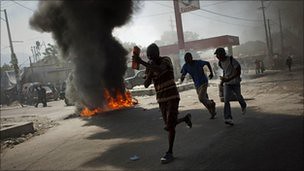
The rebellion in Haiti against the United Nations occupation forces has spread to the capital of Port-au-Prince. A cholera outbreak blamed on UN forces sparked discontent with the continuing exploitation of the masses., a photo by Pan-African News Wire File Photos on Flickr.
Havana. June 21, 2012
Cholera persisting in Haiti
Amelia Duarte de la Rosa
Granma International
CHOLERA remains prevalent in Haiti. The epidemic which began in October 2010, killing more than 7,000 people, is still in the endemic phase throughout the country. With the current rainy season, news agencies are talking of a fresh outbreak of the disease; however, the current behavior of cholera is precisely what was previously forecast.
Dr. Lorenzo Somarriba, head of the Cuban Medical Mission, explains, "The endemic phase moves through local epidemic outbreaks, given that cholera bacteria are in circulation, but the disease is behaving according to forecasts. From January through April, in the dry season, cases reported were very low; in May, the rains began and the number of people who contracted the disease increased.
"However, news agency reports are suggesting figures of up to 200,000 cases during the rest of this year and this is an overestimation, it would be half of the cases recorded in the first year of the epidemic. Endemic means that the disease remains at a stable level over a long period of time, including seasonal variations. On the basis of natural history in places where there is no adequate health infrastructure, such as Haiti, cholera remains in an endemic form for many years," he clarified.
In parallel, data from the Pan American Health Organization confirm that the global increase of cases is slow, given that there has been rain, but not as much as in previous years. The disease, principally acquired via contaminated water and food, is currently stable, with a tendency toward an increase due to the permanence of risk factors.
In Haiti, only 2% of the population has access to drinking water, there is no adequate environmental cleansing system and surface water sources are contaminated. These factors are compounded by high poverty figures, malnutrition, tuberculosis and HIV/AIDS, diseases which increase the risk of contagion.
For this reason, even though the accumulated mortality rate recorded by the Cuban Medical Brigade (BMC) continues stable – there have been no deaths this year – the brigade is ready to confront any case of contagion with focal controls on the part of its active monitoring groups.
In the BMC situation room, where a group of high-level cholera specialists work, all potential cases arriving at medical posts with a Cuban brigade presence are monitored, Somarriba notes. "The brigade has the personnel and resources to treat the disease. We have 33 observation posts, 30 cholera treatment units and two active centers prepared to receive, treat and report cases. Cases of acute diarrhea are now in third place on the chart of transmissible disorders and two departments are reporting the highest rates, Artibonite and Nord. Where there is a case we implement the epidemiological survey and act rapidly with all contacts.
"Any biological species is very difficult to eliminate, the Haitian and Dominican government authorities currently have a program to eradicate cholera on the island of La Española within a 10-year period; in other words, the non-circulation of the V. cholerae," he explained.
"In any event, the number of fatalities is in relation to the promptness or otherwise of focal controls in every case, which is why the differentiated and constant attention of our collaborators is focused on cholera. We are still distributing water-purifying chlorine tablets, monitoring and offering educational support. Thanks to all of this, Haitians now have knowledge of the disease and how to avoid it."
No comments:
Post a Comment